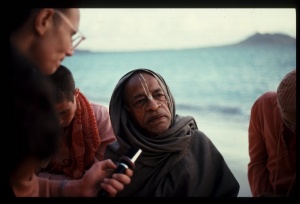CC Adi 14.15 (1975)

A.C. Bhaktivedanta Swami Prabhupada
TEXT 15
- pañca-dīrghaḥ pañca-sūkṣmaḥ
- sapta-raktaḥ ṣaḍ-unnataḥ
- tri-hrasva-pṛthu-gambhīro
- dvātriṁśal-lakṣaṇo mahān
SYNONYMS
pañca-dīrghaḥ—five large; pañca-sūkṣmaḥ—five fine; sapta-raktaḥ—seven reddish; ṣaṭ-unnataḥ—six raised; tri-hrasva—three small; pṛthu—three broad; gambhīraḥ—three grave; dvā-triṁśat—in this way thirty-two; lakṣaṇaḥ—symptoms; mahān—of a great personality.
TRANSLATION
" 'There are thirty-two bodily symptoms of a great personality: five of his bodily parts are large, five fine, seven reddish, six raised, three small, three broad and three grave.'
PURPORT
The five large parts are the nose, arms, chin, eyes and knees. The five fine parts are the skin, fingertips, teeth, hair on the body and hair on the head. The seven reddish parts are the eyes, soles, palms, palate, nails, and upper and lower lips. The six raised parts are the chest, shoulders, nails, nose, waist and mouth. The three small parts are the neck, thighs and male organ. The three broad parts are the waist, forehead and chest. The three grave parts are the navel, voice and existence. Altogether these are the thirty-two symptoms of a great personality. This is a quotation from the Sāmudrika.